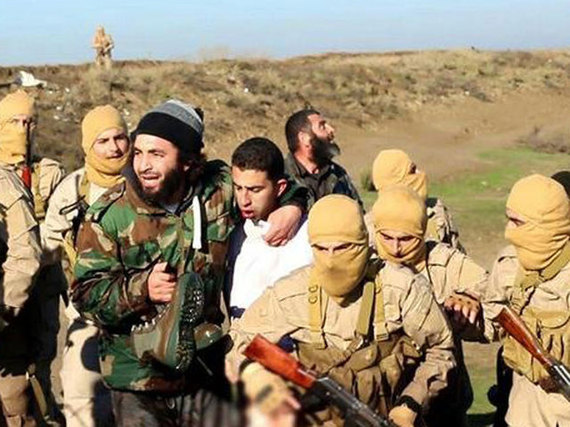In late December, 2014, a young Jordanian pilot by the name of Moaz al-Khassasbeh was taken captive by militants of the Islamic State of Iraq and the Levant when his aircraft suddenly went down near the Syrian city of Raqqah. Footage taken immediately after Khassasbeh was captured showed several ISIL militants in hoods carrying the semi-naked Jordanian pilot out of the water, one with a broad smile on his face waving a sharp blade in a possible sign of what was to come: the execution and beheading of a Muslim working with the U.S.-backed, anti-ISIL coalition.
Over a month later, the Mr. Khasasbeh is still alive. ISIL militants claiming to hold the Jordanian pilot, along with a Japanese hostage, Kenji Goto, have stated in unequivocal terms that both men would be killed unless the Kingdom of Jordan released an Iraqi woman sentenced to prison for her role in a 2005 suicide bombing on hotels in Amman that killed 60 people. King Abdullah II of Jordan, along with Jordanian intelligence services and the Jordanian military, are in an impossible position: either cave in to the demands of a terrorist group to save one of their own, or hold firm to their principles and risk seeing a Jordanian pilot killed on camera. It's a terrible quandary for any government to face, particularly in a country like Jordan, which is not used to dealing with these types of situations.
According to Jordan's state news agency, the Kingdom is seriously considering the ISIL demand. "Jordan confirms that it is completely prepared to release the prisoner Sajida al-Rishawi [the Iraqi woman] if Moaz al-Kasasbeh is released and his life is intact." Jordan has reportedly asked ISIL for a proof-of-life video of the pilot before proceeding with a possible prisoner exchange, and as of this writing, Jordanian authorities appear to be in indirect talks with ISIL militants.
Is Jordan making the right decision? It's a question that King Abdullah, his cabinet, the Jordanian people, and the Kingdom's allies will all ask whether or not a transfer takes place. Is releasing a convicted suicide bomber to ISIL a cost that can be dealt with in order to get a Jordanian citizen back alive? Or does the very nature of the exchange - responding positively to the demands of a vicious and nihilistic terrorist group - offset the gains of getting the pilot released?
On Wednesday, January 28, the Obama administration made its concerns known about reports of a possible exchange. Deputy White House Press Secretary Eric Schultz, in a question from ABC White House Correspondent John Karl, reiterated that it was U.S. policy to refuse to pay any ransom to a terrorist group during a hostage situation. Or, in the words of Shultz himself, "Our policy is we don't pay ransom, we don't give concessions to terrorist organizations."
Yet, there is an obvious problem with this statement, and it's flashing like a big, red, neon light on the side of a highway: didn't the White House negotiate with the Taliban in Afghanistan in order to gain the release of Bowe Bergdahl - an American soldier who was held by the Haqqani Network for close to five years?
The answer is yes. In fact, not only did the administration negotiate with the Taliban on a prisoner exchange, but the administration actually carried one out. Five senior Taliban commanders were flown from the Guantanamo Bay detention facility back to Afghanistan in exchange for Bergdahl - an agreement that Republican lawmakers loudly criticized as an absolute capitulation to a terrorist group. It's difficult to see that the Kingdom of Jordan is doing anything different from what the United States did last year.
Shultz tried to distinguish both of these cases during the briefing, but his explanation falls flat. Pressed by ABC's John Karl, Shultz said that "the president's bedrock commitment as Commander-in-Chief is to leave no man or woman behind. That was the principle he was operating under."
As King of the Hashemite Monarchy, King Abdullah II operates under the same exact rubric as President Barack Obama: ensuring that the government does everything it can to safeguard the lives of its men and women in uniform. President Obama certainly did everything he could last spring when Bowe Bergdahl was given back to U.S. custody, so why is it frowned upon for the Jordanian Government to operate under the same set of guidelines?
Keep in mind that I'm not advocating for a prisoner exchange with ISIL, nor am I opposing one. Reasonable people can disagree over policy, and officials across the U.S. Government are still reviewing their own procedures over hostages in order to determine what can be done to better inform the families of their loved one's predicament and keep them updated on what the government is doing to win back their freedom. But there appears to be a degree of hypocrisy in the Obama administration's position - one that U.S. allies like Jordan no doubt disagrees with.

